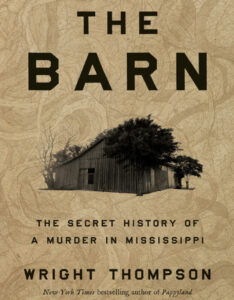
Mississippi author and ESPN senior writer Wright Thompson made an appearance at Off Square Books on Tuesday, Sept. 24 to discuss his new book, “The Barn: The Secret History of a Murder in Mississippi.”
“The Barn” delves into the story of Emmett Till, a 14-year-old Black boy who was murdered in Money, Miss. in 1955 over claims that he whistled at a white woman. These accusations were later disproven.
In his book, Thompson zeroes in on the location of Till’s murder: a barn that he only recently learned is 23 miles from his family’s farm.
“If you don’t know something that fundamental about the place you know best in the world, it’s really shaking,” Thompson said. “I didn’t have an assignment, (and) there wasn’t a book deal, that all came later. I just wanted to know. I got obsessed, and I started driving over there all the time, at first just to see it. It has a really bad energy about it, and so I was sort of pulled to it and repelled from it at the same time.”
When he started his investigation, Thompson was struck by the lack of knowledge and conversation surrounding certain aspects of Till’s murder.
“This is a murder that happened 69 years ago,” Thompson said. “Many things have changed, and if you’ve lived in Mississippi for a long time, then you know that this (conversation) would have been impossible not that long ago. Many things have changed a tremendous amount, and yet the erasure around the murder of Emmett Till, which this book chronicles, is a stand-in for every other erasure.”
Thompson said that copies of the 1956 Look Magazine edition that contains details about the murder can be found in many places — including the J.D. Williams Library at UM and the Delta State Library.
Thompson also said many items associated with Till have disappeared, including the transcripts of the murder trial, which the FBI ultimately had to obtain from the private collection of a citizen on the Gulf Coast in order to reopen the case. A ring belonging to Till also disappeared from an evidence locker in 1973.
“The erasure of this one case is startling,” Thompson said. “The question you get is, ‘Why are we still talking about this?,’ and the answer is, ‘Because we haven’t started.’ I don’t want to be doing it. I’d love to be writing about sports, but we’re having this conversation because we still haven’t had it, and it’ll be 70 years next August.”
Gloria Dickerson, who is featured throughout Thompson’s book, grew up near the barn. Dickerson and her siblings were also the first Black students to integrate their public school system in Drew, Miss.
“I believe it’s important because we want our history to be told,” Dickerson said. “We have to tell our history and make sure the truth comes out. We need to do that for our children as well.”
Dickerson oversees a program called the Emmett Till Academy, where she educates students about Black history.
“A lot of young people say, ‘We don’t know why this is important,’ and ‘We don’t know the connection,’” Dickerson said. “In order for me to survive at Drew High School when I did, my mom taught us a lot about where we came from and why it was so important. She taught us (we) were not inferior (because) she knew society was trying to make Black people feel like they were inferior to them. I don’t want the younger people now who are born into something like this to continue to think that they are inferior just because they don’t have what other people have, so it’s important to know how they got here.”
John T. Edge, a writer and former director of the Southern Foodways Alliance who attended the Off-Square Books event, said that Thompson’s book is timely and vital.
“I’m friends with the author, but I can say that I’ve already bought two copies of the book,” Edge said. “I think it’s an important book for this moment in America. This book is historical in nature and that history is made alive in this moment, and we need to know that history.”
Lena Anderson has been anticipating the release of Thompson’s book and is intrigued to hear more.
“I am very excited to learn more about this book,” Anderson said. “I’ve been excited for it to come out and to hear Wright talk about the book and give more insight into his process of writing it.”
Anderson also mentioned the importance of hearing the perspective of someone who is native to the area he is writing about.
“I think this story has been very erased in history and hidden and hasn’t been talked about enough,” Anderson said. “(Thompson) is such a good journalist and such an incredible researcher. The stuff that he was able to dig up and find out is incredible. The fact that the rest of the world will be able to hear that stuff is great.”



























